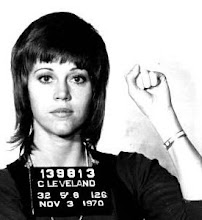No one deserves that much money

According to a recent article by Naomi Klein, Conrad Black's lawyers had a hard time finding a jury that did not resent a filthy rich man who represented corporate America. The idea that all corporations and big businesses serve only themselves and line their pockets from the labour of underpaid workers is commonly held by, well, the common folk.
"Black has come face to face with the casualties of the boom's collapse and of the ideological revolution he so aggressively globalized.
As the judge questioned a pool of 140 prospective jurors in order to whittle the group down to 12, plus eight alternates, she found men and women who had "lost every dime" in the WorldCom collapse, whose pensions had evaporated on the stock market, who had been fired thanks to outsourcing and who'd had their finances ravaged by identity theft.
Asked what they thought of executives who earn tens of millions of dollars, prospective jurors answered almost uniformly in the negative. "Who could possibly do that much work or be that capable?" one asked.
A union mechanic's apprentice pointed out that no matter how much he works, "I'm barely getting by as it is, living at home." No one said, "More power to you."
Many appeared to regard North America's ultra-rich the way Russians see their oligarchs: even if the way they amassed their fortunes was legal, it shouldn't have been. "I just don't think anyone should get that amount of money from any company, example Enron and WorldCom," one prospective juror wrote.
Others said, "I feel that there is corruption everywhere"; anyone paid as much as Black "probably stole it"; "I am sure this goes on all the time and I hope they get caught." John Tien, an accountant at Boeing, launched into such an elaborate lecture about the accounting scams endemic in corporate America that Black's lawyers asked the judge to question him in private to prevent his views from influencing the other potential jurors.
Regardless of what else happens in the Black saga, the jury selection process has already provided an extraordinary window onto the way regular Americans, randomly selected, view their elites not as heroes, but as thieves.
As far as Black is concerned, this is all terribly unfair. He is being "thrown to the mobs" because of rage at the system and because, unlike American billionaires, he doesn't "dress in corduroy trousers" or donate his fortune to AIDS charities. Black's lawyers even argued (unsuccessfully) that their client could not get a fair trial because the average Chicagoan 'does not reside in more than one residence, employ servants or a chauffeur, enjoy lavish furniture or host expensive parties'".
Nope, the only way Black can got off on this one is if he is tried by his peers, that is, a group of elitest wealthy business people who know about the hardships of getting caught.
Labels: pop culture





0 Comments:
Post a Comment
<< Home